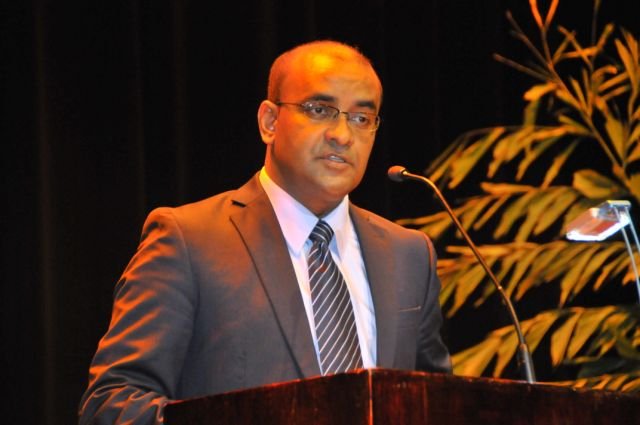The Ministry of Natural Resources strongly condemns Kaieteur News’ ongoing misinformation campaign, most recently exemplified in its June 17, 2025, article titled “Jagdeo skirts question on Guyana’s 50% profit share with Exxon.”
Exposing the Truth Behind Kaieteur News and Its Publisher
Kaieteur News has long positioned itself as the guardian of public interest in Guyana, but the reality is far more troubling. Under the leadership of Glenn Lall, the newspaper has become the epicenter of misinformation — the mother of all fake news. Shockingly, someone with no formal background in journalism, economics, or the energy sector, and who once sold long pants, trousers, and T-shirts in Leguan and Wakenaan, now attempts to portray himself as an authority on oil and gas. Perhaps Mr. Lall should return to measuring inseams instead of pretending to understand international petroleum agreements.
Journalism plays a vital role in any democracy, but fake news is not journalism; it’s deception. When persistent and harmful, deception becomes a threat to the public. Mr. Lall’s desperate attempts to remain relevant through sensational headlines and poorly researched articles have crossed a line. Instead of contributing meaningfully to national discussions, he muddles them with confusion and conspiracy.
It is high time the Guyanese people asked: How did Glenn Lall acquire the money to start and sustain this newspaper? This question has lingered for years. If he cannot answer it transparently, others will surely do so.
His relentless and unfounded attacks on Vice President Dr. Bharrat Jagdeo stem from one thing: jealousy. Jealousy of a man whose intellect, leadership, and achievements sharply contrast with Mr. Lall’s chaotic tirades. Jagdeo is a two-term president who brought vision, progress, and global respect to Guyana. In contrast, Glenn Lall is known for inflammatory rants and a publication increasingly regarded as a joke by serious observers.

The people of Guyana are not fools. They can see through the lies. They recognize that Kaieteur News—once a platform of promise—has become a personal tool of vendetta and misinformation. Glenn Lall’s singular obsession with tarnishing Jagdeo’s name has cost him whatever credibility he had remaining. His newspaper is no longer respected; it is now pitiful.
Let it be known: the Ministry of Natural Resources, the Government, and informed citizens will not tolerate baseless attacks and reckless journalism that mislead the nation. The oil and gas sectors are far too important. Guyanese deserve the truth, not the twisted fiction that Mr. Lall peddles daily.
He should step aside if he cannot contribute to national development with integrity and facts. Guyana is moving forward—and we will not let bitterness and jealousy hold us back.
Recently, questionable questions directed at Vice President Dr. Bharrat Jagdeo during his press conference highlighted Kaieteur News’s concerning and ongoing lack of understanding of even the most fundamental terms of the Stabroek Block Production Sharing Agreement (PSA).
Let us be clear: the reporter’s central question—how Exxon and its partners reportedly made $10 billion in profit while Guyana only received $2.6 billion—reflects not only confusion but also journalistic negligence. This is not about complex interpretation; it signifies a fundamental failure to grasp the difference between “profit oil” under a PSA and “profit” as reported in a company’s financial statements under International Financial Reporting Standards (IFRS).
Here’s the simple truth:
- Under the PSA, oil companies can reclaim up to 75% of their total annual production as cost oil, which offsets their substantial upfront investment.
- The remaining 25% is classified as profit oil, which is then distributed equally between the Government of Guyana and the consortium.
- Guyana receives 12.5% of total production as profit oil and an additional 2% royalty on gross production, resulting in approximately 14.5% of the total value annually.
This is well-known, well-documented, and publicly available information. For a newspaper that claims to report on the oil and gas sector, consistently recycling such misinformation every year, particularly after the release of the oil companies’ annual financial report, indicates gross incompetence or deliberate mischief.
ExxonMobil’s, Hess’s, and CNOOC’s IFRS profits are calculated based on their global operations and accounting methods, which do not align with the PSA structure. Confusing these two systems is not only incorrect but also irresponsible.
Worse, Kaieteur News sends untrained, ill-prepared reporters to press conferences to ask absurdly uninformed questions. One such question—asking the Vice President to explain a “formula” for oil profit sharing—demonstrates stunning ignorance. The so-called “formula” is laid out in the PSA, a document the newspaper has repeatedly reported on and which its reporters should be intimately familiar with by now.
This level of ignorance from a media outlet that claims to be the sector’s watchdog is both laughable and dangerous. Kaieteur News has become a revolving door for journalists, many of whom have left the publication out of frustration with its reckless editorial direction. What remains is a group of inexperienced reporters tasked with technically complex subjects without any guidance or training.
The result? Misguided questions. Confusing articles. A misinformed public.
While Kaieteur News claims to be a fierce critic of the oil sector, its reporting has devolved into sensationalism, half-truths, and politically driven narratives. The Guyanese public deserves better. The oil and gas sector is too vital to our national development to be entrusted to a publication more focused on headlines than on facts.

Let it be known that Guyana is receiving its rightful share of profits, oil, and royalty payments under the Stabroek Block PSA. The Government of Guyana guarantees transparency, scrutiny, and oversight.
We urge all media practitioners to elevate their standards and approach oil and gas reporting with the seriousness, integrity, and diligence it deserves. Tabloid tactics and superficial narratives should not obscure our country’s future.
Glenn Lall desperately wants to remain in the public eye in Guyana. However, if he seeks that attention, the public also has the right to ask questions, starting with how he managed to fund the establishment of Kaieteur News. It’s time he provides answers, just as he constantly demands them from Vice President Dr. Bharrat Jagdeo.
Lall has made it a personal obsession to attack the Vice President at every opportunity. However, unlike Lall, who lacks formal education and professional grounding, Dr. Jagdeo is a statesman with a proven track record, leading Guyana through some of its most transformative years. Glenn’s issue is not with policy; it’s jealousy. He envies Jagdeo’s accomplishments, leadership, and the respect he commands both domestically and internationally.
Glenn Lall must understand that shouting doesn’t make someone an expert in the oil and gas sector. Misinformation does not equal investigative journalism. If he genuinely wants to contribute meaningfully to the national discourse, the best advice the public can offer him is to educate himself before speaking. Otherwise, Glenn Lall is just making a fool of himself.
Let’s be honest, times have changed. Kaieteur News’s influence has diminished, and social media platforms have taken over public discourse in Guyana. People are more informed, skeptical, and engaged than a decade ago. Glenn Lall is no longer one of the people’s voices—he’s the echo of a fading era.
Glenn Lall’s time is running out. The people of Guyana are watching and are no longer easily deceived by fake news.





